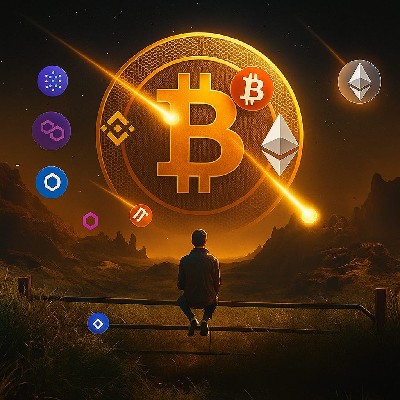
Gitcoin PriceGTC
GTC/USD price calculator
Live Gitcoin Price Today in USD
Do you think the price of Gitcoin will rise or fall today?
Gitcoin Market Info
About Gitcoin (GTC)
What Is Gitcoin?
Launched in November 2017, Gitcoin has established itself as a vital hub for coders and developers, particularly in the Ethereum ecosystem. The platform's primary mission is to support the development of open-source software, a sector often overlooked in terms of funding and recognition. Gitcoin stands out by providing financial incentives for developers to engage in open-source projects, thereby addressing a critical gap in the digital infrastructure landscape.
At its core, Gitcoin is driven by the ideology that open-source software is fundamental to modern computing and software development. By funding "public goods" projects, which are non-rivalrous and non-excludable, Gitcoin aligns with the broader goals of the blockchain community. These projects range from initiatives improving privacy and infrastructure to those directly enhancing the Ethereum blockchain. The platform not only offers a sustainable model for developers through hackathons, bounties, and community grants but also encourages the submission of innovative project ideas for crowdfunding.
How Does Gitcoin Work?
The operational framework of Gitcoin focuses on various mechanisms to support and incentivize open-source development. A key feature of Gitcoin is its quadratic funding model. This unique approach to crowdfunding democratically aligns the interests of small and large donors. Unlike traditional 1:1 matching, quadratic funding uses a proprietary formula that gives more weight to projects with broader community support. This system ensures that projects with a wide appeal receive more funding, encouraging developers to work on projects that resonate with the community.
Gitcoin Bounties represent another significant aspect of the platform. Here, users can fund specific technological issues and crowdsource solutions from the developer community on Gitcoin. These bounties can be permissioned, requiring funder approval, or permissionless, open for any developer to tackle. This system not only facilitates targeted problem-solving but also allows developers to earn based on the size and complexity of the bounties, with larger bounties offering higher potential earnings.
In addition to these mechanisms, Gitcoin's Kernel Fellowship and various hackathons provide additional avenues for developers to connect, collaborate, and innovate within the Web3 space. These initiatives not only foster community engagement but also contribute to the continuous evolution of the blockchain ecosystem.
What Is GTC Token?
GTC is the native governance token of the Gitcoin ecosystem. With a total supply of 100 million tokens, the distribution is strategically planned: 15% through a retroactive airdrop to platform users, 35% to existing stakeholders, and 50% reserved for the Gitcoin decentralized autonomous organization (DAO). This token distribution strategy is designed to reward both early and future contributors to the platform.
The GTC token empowers community governance on Gitcoin. As the platform transitions towards complete decentralization, token holders gain the ability to propose and vote on various platform-related proposals. This governance model exemplifies the decentralized ethos of the blockchain community, ensuring that the future direction of Gitcoin aligns with the collective interests of its users.
What Determines Gitcoin's Price?
The price of Gitcoin (GTC), like any cryptocurrency, is influenced by a complex interplay of factors within the blockchain and cryptocurrency markets. One of the primary determinants is market demand and supply dynamics. The value of GTC tokens hinges on the balance between how many tokens are available (supply) and how many investors want to buy them (demand). This demand is often driven by the perceived utility and potential of the Gitcoin platform, especially its role in funding open-source projects within the Ethereum ecosystem. As the platform gains more recognition for its innovative approach to supporting public goods and open-source software, the demand for GTC tokens may increase, positively impacting its price.
Another crucial factor is investor sentiment, which can be influenced by broader market trends, news, and developments within the Gitcoin ecosystem itself. Positive news, such as successful funding rounds, impactful project completions, or significant updates to the platform, can boost investor confidence and drive up the price. Conversely, negative news or broader market downturns can lead to decreased confidence and a drop in price. Additionally, the role of GTC in governance and its distribution model — including the airdrop to early users and the allocation for the decentralized autonomous organization (DAO) — also plays a significant role in shaping its market value. These aspects affect not only the token's utility but also its perception among investors as a tool for governance and community engagement in the burgeoning field of Web3 and decentralized finance (DeFi).
Furthermore, the integration and partnerships that Gitcoin forms within the blockchain ecosystem can significantly impact GTC's price. Collaborations with other blockchain projects, improvements in the platform's functionality, and its effectiveness in funding and supporting new projects can enhance Gitcoin's reputation, thereby attracting more users and investors. This increased adoption and recognition can, in turn, lead to a higher demand for GTC tokens. As the cryptocurrency and blockchain landscape continues to evolve, the factors influencing Gitcoin's price are likely to expand and shift, reflecting the dynamic nature of this innovative and rapidly growing sector.
For those interested in investing or trading Gitcoin, one might wonder: Where to buy GTC? You can purchase GTC on leading exchanges, such as Bitget, which offers a secure and user-friendly platform for cryptocurrency enthusiasts.
AI analysis report on Gitcoin
Gitcoin Price History (USD)
 Lowest price
Lowest price Highest price
Highest price 
What is the highest price of Gitcoin?
What is the lowest price of Gitcoin?
Gitcoin Price Prediction
When is a good time to buy GTC? Should I buy or sell GTC now?
What will the price of GTC be in 2026?
What will the price of GTC be in 2031?
Hot promotions
Global Gitcoin Prices
How to buy Gitcoin(GTC)

Create Your Free Bitget Account

Verify Your Account

Convert GTC to USD
FAQ
What is the current price of Gitcoin?
What is the 24 hour trading volume of Gitcoin?
What is the all-time high of Gitcoin?
Can I buy Gitcoin on Bitget?
Can I get a steady income from investing in Gitcoin?
Where can I buy Gitcoin with the lowest fee?
Related cryptocurrency prices
Where can I buy Gitcoin (GTC)?
Video section — quick verification, quick trading

GTC/USD price calculator
GTC resources
Bitget Insights





Trade
Earn
GTC/USDT
SpotGTC/USDT
MarginGTC/USDT
USDT-M FuturesPrices of newly listed coins on Bitget








